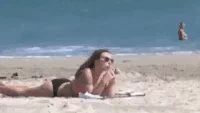Cigarette butts are the most common form of marine
litter.
 Broken bottles, plastic toys, food
wrappers ... during a walk along the coast one finds any of these items, and
more.
Broken bottles, plastic toys, food
wrappers ... during a walk along the coast one finds any of these items, and
more. In all that litter, there is one item more common than any other: cigarette butts.
Cigarette butts are a pervasive,
long-lasting, and a toxic form of marine debris.
They primarily reach our waterways through improper disposal on beaches, rivers, and anywhere on land, transported to our coasts by runoff and stormwater. Once butts reach the beach, they may impact marine organisms and habitats.
They primarily reach our waterways through improper disposal on beaches, rivers, and anywhere on land, transported to our coasts by runoff and stormwater. Once butts reach the beach, they may impact marine organisms and habitats.
 Most cigarette filters are made out
of cellulose acetate, a plastic-like material that’s easy to manufacture, but
not easy to degrade.
Most cigarette filters are made out
of cellulose acetate, a plastic-like material that’s easy to manufacture, but
not easy to degrade. The fibers in cigarette filters behave just like plastics in our oceans, the UV rays from our sun may break the fibers down into smaller pieces, but they don’t disappear. One solid filter ends up being thousands of tiny microplastics.
Here’s what you can do about keeping
those cigarette butts, lighters and cigar tips from spoiling our ocean:
If you smoke, don’t flick your butt!
Place it in a proper receptacle.
Organize cleanups in your local
community. Make sure you document your findings with the Marine Debris
Tracker App.
Be an environmental steward in your own
community. Spread awareness about cigarette butt litter.
Worried about the smell from cigarettes in your pocket? Purchase a pocket ashtray! These trays can come in the form of metal boxes or vinyl pouches, fit in your pocket, purse, or backpack, and extinguish cigarettes until they can be properly disposed of in the trash.
Recycle your butts! Although it is
not common, there are a few places, like the City of Vancouver, and
organizations, like TerraCycle, that will actually recycle your filters for
you. Check to see if there any programs in your area.
The NOAA Marine Debris Program is the
U.S. Federal government's lead for addressing marine debris.